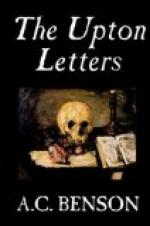This is a melancholy jeremiad, I am well aware; but it is also a frame of mind which grows upon me; and, to come back to my original proposition, it is the stupidity of virtuous men which is responsible for the continuance of this arid, out-of-joint system.— Ever yours,
T. B.
Upton,
July 22, 1904.
My dear Herbert,—. . . I took a lonely walk to-day, and returned through a new quarter of the town. When I first knew it, thirty years ago, there was a single house here—an old farm, with a pair of pretty gables of mellow brick, and a weathered, solid, brick garden-wall that ran along the road; an orchard below; all round were quiet fields; a fine row of elms stood at the end of the wall. It was a place of no great architectural merit, but it had grown old there, having been built with solidity and dignity, and having won a simple grace from the quiet influences of rain and wind and sun. Very gradually it became engulphed. First a row of villas came down to the farm, badly planned and coarsely coloured; then a long row of yellow-brick houses appeared on the other side, and the house began to wear a shy, regretful air, like a respectable and simple person who has fallen into vulgar company. To-day I find that the elms have been felled; the old wall, so strongly and firmly built, is half down; the little garden within is full of planks and heaps of brick, the box hedges trodden down, the flowers trampled underfoot; the house itself is marked for destruction.
It made me perhaps unreasonably sad. I know that population must increase, and that people had better live in convenient houses near their work. The town is prosperous enough; there is work in plenty and good wages. There is nothing over which a philanthropist and a social reformer ought not to rejoice. But I cannot help feeling the loss of a simple and beautiful thing, though I know it appealed to few people, and though the house was held to be inconvenient and out of date. I feel as if the old place must have acquired some sort of personality, and must be suffering the innocent pangs of disembodiment. I know that there is abundance of the same kind of simple beauty everywhere; and yet I feel that a thing which has taken so long to mature, and which has drunk in and appropriated so much sweetness from the gentle hands of nature, ought not so ruthlessly and yet so inevitably to suffer destruction.




